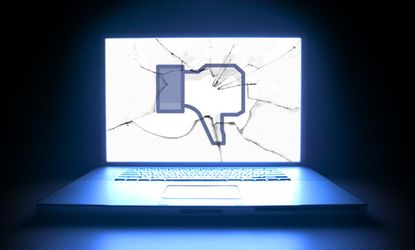Is Facebook going to hit its 'breakpoint'?
Think of it as the tipping point's scary cousin


"What is missing — what everyone is missing — is that the unit of measure for progress isn't size, it's time," writes Jeff Stibel in his fascinating book Breakpoint: Why the Web will Implode, Search will be Obsolete, and Everything Else You Need to Know about Technology is in Your Brain. The book is about "understanding what happens after a breakpoint. Breakpoints can't and shouldn't be avoided, but they can be identified."
In any system continuous growth is impossible. Everything reaches a breakpoint. The real question is how the system responds to this breakpoint. "A successful network has only a small collapse, out of which a stronger network emerges wherein it reaches equilibrium, oscillating around an ideal size."
The book opens with an interesting example.
Subscribe to The Week
Escape your echo chamber. Get the facts behind the news, plus analysis from multiple perspectives.

Sign up for The Week's Free Newsletters
From our morning news briefing to a weekly Good News Newsletter, get the best of The Week delivered directly to your inbox.
From our morning news briefing to a weekly Good News Newsletter, get the best of The Week delivered directly to your inbox.
In 1944, the United States Coast Guard brought 29 reindeer to St. Matthew Island, located in the Bering Sea just off the coast of Alaska. Reindeer love eating lichen, and the island was covered with it, so the reindeer gorged, grew large, and reproduced exponentially. By 1963, there were over 6,000 reindeer on the island, most of them fatter than those living in natural reindeer habitats.
There were no human inhabitants on St. Matthew Island, but in May 1965 the United States Navy sent an airplane over the island, hoping to photograph the reindeer. There were no reindeer to be found, and the flight crew attributed this to the fact that the pilot didn't want to fly very low because of the mountainous landscape. What they didn't realize was that all of the reindeer, save 42 of them, had died. Instead of lichen, the ground was covered with reindeer skeletons.
The network of St. Matthew Island reindeer had collapsed: The result of a population that grew too large and consumed too much. The reindeer crossed a pivotal point , a breakpoint, when they began consuming more lichen than nature could replenish. Lacking any awareness of what was happening to them, they continued to reproduce and consume. The reindeer destroyed their environment and, with it, their ability to survive. Within a few short years, the remaining 42 reindeer were dead. Their collapse was so extreme that for these reindeer there was no recovery. [Breakpoint]
In the wild, of course, reindeer can move if they run out of lichen, which allows lichen in the area to be replenished before they return.
Nature rarely allows the environment to be pushed so far that it collapses. Ecosystems generally keep life balanced. Plants create enough oxygen for animals to survive, and the animals, in turn, produce carbon dioxide for the plants. In biological terms, ecosystems create homeostasis. [Breakpoint]
We evolved to reproduce and consume whatever food is available.
Back when our ancestors started climbing down from the trees, this was a good thing: food was scarce so if we found some , the right thing to do was gorge. As we ate more, our brains were able to grow, becoming larger than those of any other primates. This was a very good thing. But brains consume disproportionately large amounts of energy and, as a result, can only grow so big relative to body size. After that point, increased calories are actually harmful. This presents a problem for humanity, sitting at the top of the food pyramid. How do we know when to stop eating? The answer, of course, is that we don't. People in developed nations are growing alarmingly obese, morbidly so. Yet we continue to create better food sources, better ways to consume more calories with less bite.
Mother Nature won't help us because this is not an evolutionary issue: most of the problems that result from eating too much happen after we reproduce, at which point we are no longer evolutionarily important. We are on our own with this problem. But that is where our big brains come in. Unlike reindeer, we have enough brainpower to understand the problem, identify the breakpoint, and prevent a collapse. [Breakpoint]
We all know that physical things have limits. But so do the things we can't see or feel. Knowledge is an example. "Our minds can only digest so much. Sure, knowledge is a good thing. But there is a point at which even knowledge is bad." This is information overload.
We have been conditioned to believe that bigger is better and this is true across virtually every domain. When we try to build artificial intelligence, we start by shoveling as much information into a computer as possible. Then we stare dumbfounded when the machine can't figure out how to tie its own shoes. When we don't get the results we want, we just add more data. Who doesn't believe that the smartest person is the one with the biggest memory and the most degrees, that the strongest person has the largest muscles, that the most creative person has the most ideas? [Breakpoint]
Growth is great until it goes too far.
Sign up for Today's Best Articles in your inbox
A free daily email with the biggest news stories of the day – and the best features from TheWeek.com
[W]e often destroy our greatest innovations by the constant pursuit of growth. An idea emerges, takes hold, crosses the chasm, hits a tipping point, and then starts a meteoric rise with seemingly limitless potential. But more often than not, it implodes, destroying itself in the process. [Breakpoint]
Growth isn't bad. It's just not as good as we think.
Nature has a lesson for us if we care to listen: the fittest species are typically the smallest. The tiniest insects often outlive the largest lumbering animals. Ants, bees, and cockroaches all outlived the dinosaurs and will likely outlive our race. … The deadliest creature is the mosquito, not the lion. Bigger is rarely better in the long run. What is missing — what everyone is missing — is that the unit of measure for progress isn't size, it's time. [Breakpoint]
Of course, "The world is a competitive place, and the best way to stomp out potential rivals is to consume all the available resources necessary for survival."
Otherwise, the risk is that someone else will come along and use those resources to grow and eventually encroach on the ones we need to survive. [Breakpoint]
Networks rarely approach limits slowly "… they often don't know the carrying capacity of their environments until they've exceeded it. This is a characteristic of limits in general: the only way to recognize a limit is to exceed it. " This is what happened with MySpace. It grew too quickly. Pages became cluttered and confusing. There was too much information. It "grew too far beyond its breakpoint."
There is an interesting paradox here though: unless you want to keep small social networks, the best way to keep the site clean is actually to use a filter that prevents you from seeing a lot of information, which creates a filter bubble.
Stibel offers three phases to any successful network.
[F]irst, the network grows and grows and grows exponentially; second, the network hits a breakpoint, where it overshoots itself and overgrows to a point where it must decline, either slightly or substantially; finally, the network hits equilibrium and grows only in the cerebral sense, in quality rather than in quantity. [Breakpoint]
He offers some advice:
Rather than endless growth, the goal should be to grow as quickly as possible — what technologists call hypergrowth — until the breakpoint is reached. Then stop and reap the benefits of scale alongside stability.
Breakpoint goes on to predict the fall of Facebook.
Farnam Street also feeds your brain every Sunday with Brain Food. Join 34,000 other smart people and read what you've been missing.
More from Farnam Street...
Create an account with the same email registered to your subscription to unlock access.
-
 'Voters know Biden and Trump all too well'
'Voters know Biden and Trump all too well'Instant Opinion Opinion, comment and editorials of the day
By Harold Maass, The Week US Published
-
 Is the Gaza war tearing U.S. campuses apart?
Is the Gaza war tearing U.S. campuses apart?Today's Big Question Protests at Columbia University, other institutions, pit free speech against student safety
By Joel Mathis, The Week US Published
-
 DOJ settles with Nassar victims for $138M
DOJ settles with Nassar victims for $138MSpeed Read The settlement includes 139 sexual abuse victims of the former USA Gymnastics doctor
By Justin Klawans, The Week US Published